Mike Sherry is the Director Sportif for the CRCA/Empire Cycling Team. He is also runs the New York City operation for Performance Labs HC which provides coaching, testing and bike fit services. As a rider he was the 2006 CRCA ITT Club Champion. photos by Maria Quiroga
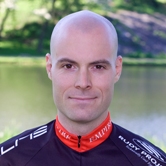
You started the team as a CRCA sub-team in 2007. Most of the riders were top riders from the club . What were your goals for the first year and what were your future plans?
The first year was very much about learning how to run a team with pretty big racing goals. It seems pretty straightforward but logistically these things get exponentially more complicated when you consider that guys have day jobs, school, families, different racing goals, and of course you’re dealing with a huge range of personalities.
I was lucky to freelance a little with the Lipton and Navigator’s programs from in 2005-2007 so I had some first-hand experience before trying to work with a program like this. The staff from those teams are still good friends and they really taught me how to do certain things and how we would have to adjust the approach for an elite amateur program. I was also extremely lucky to be paired with a sponsor who really rolled up his sleeves and dove in headfirst. The team behind the team is just as important as the guys we see on the road. I’m clearly the most visible in the management but the team owner, the GM, and Operations Manager are the glue that has kept us growing and rolling on. Ron Domb, the president of the Empire Hotel Group and the owner of the team, meets with me most weeks and we work on everything from the nitty-gritty logistics to the big picture stuff. He’s been instrumental in keeping the whole program on point. Empire has also supported the entire sport by helping with Junior events, sponsoring events like Harlem, and helping out industry people who need a place to stay when in New York. Having a sponsor that also functions as management has always kept us a step ahead in terms of professionalism and efficiency. There are way more resources behind this team than if it were to be run by traditional mid-level sports management company.
Our initial goal was to make a great NYC based team in order to keep travel costs down and quickly define a team identity. The first year there were clearly more set up costs so it was part necessity and part us just trying to keep it manageable. NYC has a lot of great talent so it’s not crazy to try something like this and the CRCA itself had the core talent, which made it especially easy. The sub-team structure has really helped to bring in a larger volume of talent than there would otherwise be room for. In 2005 and 2006 I remember specifically thinking about how the competition level within the club had steadily improved. The bummer was that when we went out of town the sub-teams obviously still raced against each other. I had raced some bigger races as a composite rider those years and that wasn’t really the answer in my mind. There needed to be a team dynamic that was continuous throughout the entire season.
The first year we aimed to consolidate some of NYC’s talent taking riders from Axis, Merrill Lynch, Fraysee, Sakonnet, Mengoni, Foundation, and two up and comers from NYvelocity. It was a really manageable way to get team rides together and to really work things out before we hit the road.
Our first mission is pro development, which is a lot like Sakonnet. What made us different is that, unlike many pro development teams, we made our roster a little older than one would expect. My thoughts were that if every rider were U25, one, you have to have major direction which is really hard since it’s nobody’s full time job, two, riders are often equally inexperienced so certain concepts just get lost in translation and three, the talent pool has to be much bigger than NYC. Sakonnet was a great example of a program that stuck to the U25 theme. Baz and Matt Koshara did an amazing job as the results clearly show, developing some really solid pros over the years. In our case I knew my own limits and also didn’t feel we needed another program that did the exact same thing. Our approach is to focus on a few recruits that are young and need a season or two to show their abilities at the top level. With the support riding coming from older, more experienced riders, you also have a great mentoring system that isn’t dependent solely on one or two directors.
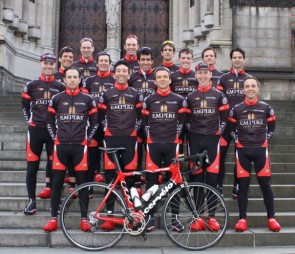
Congratulations on a great 2008 season. You won the Elite Nationals TT Championship with Jon Chodroff, you won a bunch of NRC points, you won Bear Mountain with Matt Johnson and you graduated two guys to the pro ranks, Chodroff to Ouch/Maxis and Sheldon Deeny to Bissell. How did the season results compare to your expectations?
Thanks. It was a really great year. There were definitely a lot of ups and a few downs. The ups were exceptional. I was especially happy to see Deeny and Chodroff get to the next level with such great teams. It was probably the most difficult off-season for domestic pros in a long time.
The entire team really came together in 2008. The change over from the first year was a real challenge because there was so much new talent coming on from a much bigger region. Naturally, it makes logistics harder. I definitely expected an improved team; however, we never expected to start off as strong as we did.
This particular group clicked from the gun. I think it was mostly due to having an already well defined racing style, a returning core squad that knew the drill, and then having a really great recruiting year where we picked up not just one but several of the top guys in the country. In our first year we went out and did everything as a team and I think that turned a lot of heads.
In 2008 we were a much deeper team and that gave us a lot of latitude to do tactical things that other teams can’t necessarily do. We often lined up at races, even some major Pro/1 & NRC races with no clear leader and no obvious tactical game plan. We swapped the leaders jersey at the Tour of NJ and won the overall with Margarite’s RR breakaway and our GC rider, despite Chodroff winning the prologue of Fitchburg, was in fact Johnson who did a top 10 in about every stage. Chodroff is amazing, as we all know but not as good at technical riding as Johnson which would make for a tough criterium and circuit race. I remember people trying to figure out what the heck we were doing in races like those and in the end they worked consistently to our advantage.
What’s ahead for 2009? Do you have goals concerning NRC points. Will the team compete in CRCA races.
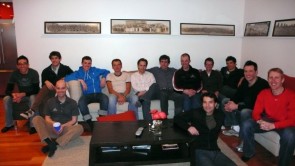
The goal every season is to get a little better than we were the year before. For us the most important thing is to get to the biggest races and get our riders the most exposure whether it be NRC, UCI, a regional race with a great field. We finished high up in the NRC team standings last year for and elite amateur team but it was never a priority. We attended a lot of big races with good results all around but it’s nearly impossible for us to race a full NRC schedule especially with so much of it going on out west. This year our big goals will be races like Univest (UCI 1.2), the Tour of Battenkill, the Tour of New York (now a 7-day 2.2 UCI race), Joe Martin (NRC), and Fitchburg (NRC 2.3) where we won a stage with Chodroff and finished 6th in the GC with Johnson last year. We’ve also just accepted an invite to Redlands, which opens the NRC calendar for the season. Of course we’ll race as many big races in the Northeast as we can send proper squads to.
We always make CRCA open races a priority. We’ve finished 2nd in 2007 and won Bear in 2008. We love Harlem, Grant’s Tomb, and the Mengoni GP as well. We put those races on our schedule every year. Each race draws great fields and with local sponsors they are important races for us to do well in. Since the majority of the roster is still based in NYC we’ll also be out doing some club races. We don’t have any particular goals within the club events except to race hard and have fun. When the season hits full swing we can’t make a lot of the club events or only a few guys can show up so there’s not much sense in making it a goal. The first year we won the Team Cup, the TT champs, and the Club Champs. It was a lot of fun but it wasn’t something we set out to do. It was mainly a product of us not traveling as much that season and having a full NYC roster. I’ve always enjoyed the club races, especially in the spring. It’s a really nice way to get a race rhythm back with solid fields without having to travel. There’s plenty of travel April till September!
Everyday I read about another NRC race being canceled. The Priority Health sponsored races in Michigan, The Tour of Oregon, some others I forget. The schedule already seems reduced from several years ago. How does this affect your plans? How is this effecting the development of racing in the US?
The first rule of “the plan” in cycling is to realize that the plan is always changing. You really have to roll with it and always be ready to change the course as a rider and as a team. It happened a lot last season and we adapted well with races moving, being postponed, or some we didn’t get invites to. We also had key guys out all season; Johnson and Minturn with tendonitis, Chodroff was out for five weeks after doing a face plant and taking a shifter through his thigh, Zmolik broke his femur in February and then his foot in two places at the Tour of Sommerville, Loehner was out late in the year with a major head injury, and Bremer with a ruptured kidney at Chris Thater.
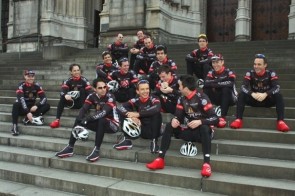
I think a lot of us, especially those that joined the sport in part as a result of the Armstrong era, think of the fitness programs made famous by Lance’s tour preps in a really clear periodization-peak model. While it’s definitely good to have specific goals and a plan in mind, the season is long and those guys and teams with the most consistent fitness will generally have a better season. They’ll have more to contribute, better results, and bounce back faster physically (and emotionally) from setbacks. All of our riders are prepared like that. Ultimately, that’s what being a pro is for 99% of the peloton. I think our approach is really good prep for our young guys looking to be professionals some day. You essentially go all out all season and hope to catch some rest in between but you’re always coming from a pretty high level of fitness and avoid putting all of your eggs in one basket.
As far as it affecting the development of racing, I’m not really sure how it will impact things. The economy is down across the board and cycling is no exception. Races and teams are at risk of shrinking or losing budgets all together. The way I see it this year is that with a more consolidated NRC schedule, each team will be sending their “A” game so I think that the racing will be a lot harder in many ways. For example, with a race like Mt Hood (Tour of Oregon) not happening under the NRC all the pro teams will be a Joe Martin instead of seeing split squads between two major races like we’ve seen in years past. It could potentially be good for the quality of racing in the short term. In the long term we need more races though (grassroots and professional) to feed the growth of the sport in this country and to keep attracting all the great talent from abroad. With a more consolidated NRC schedule and bigger pro squads in attendance, it will also make it very difficult for elite teams to get into races. The quality of the races you get invited to is a big part of what draw the next season’s top recruits.
Where do you see the team going in future years?
I have to say we feel really lucky to have a team when looking around at how much sponsorship has been withdrawn this past year. The Empire Hotel Group has been amazing in their support of the riders, staff, and the sport in general. In terms of growth we would like to continue inching our way up. We are always looking for addition financial and equipment support for the team to support more racing and perhaps a pro license in the years to come. The current economic climate is certainly difficult but I believe, when mobilized properly, cycling sponsorship is some of the best bang for your buck. It’s a marginal investment when compared to other advertising options, It’s a targeted demographic, the fan base is loyal, and generally well off. I’d personally love to see us grow into pro cycling and pro development program in the coming years. For now it’s baby steps though, improve on last year and reevaluate.
How do you view the team’s relationship with CRCA? How do you think we can make better use of your accomplishments within the club? Quite a few top programs originated in the club, Lipton, Hot Tubes, Sakonnet and Empire. What is it about CRCA that leads to these developments.
It’s really flattering to be grouped in with the above-mentioned teams. I think we’re still a work in progress by comparison though. (By the way you forgot the thinkracing-Breitling team. They won Univest one year!) The CRCA is a great place for strong teams to be born. Like I said before, the quality and quantity of talent is really high which is probably statistically normal if you put 700 cyclists together. The sub-team structure is the main catalyst that feeds that growth and keeps people in the club. You can never have too many teams. NYC is really unique in that people can be really generous with their time, energy, money, or whatever else they have to offer if they really believe in something.
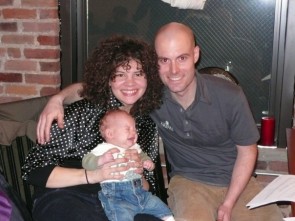
Congratulations on becoming a father. Since becoming a father, has your view of cycling changed at all? How do you see your future role with Empire and with the sport?
Thanks. Yeah, it’s been a great winter so far. I’m on a vastly different training and sleep regimen than ever before! My view of cycling hasn’t changed. It’s the best sport in the world! The toughest thing for me will be going away on the extended racing trips and training camps. That’s not to say last year was a breeze by any means. But now I have to leave my TWO favorite ladies at home. I’ve always had jobs that required a lot of travel and what I’ve noticed over the past two years is that it’s not nearly as much fun hitting the road. The nice thing about cycling though is that it’s an extended family to some degree. We race the same teams most weekends and see the same riders and staff all over the country so there’s a familiarity even in a new strange place. That always helps but I think this will be the hardest year yet. My role with the team doesn’t change this year except I won’t be suiting up to race as much. Last year I did a few of the spring races in PA , Jersey, and New England with the new guys mainly to see how things were developing. That won’t be as important this year since we’ve added guys that I know well as racers.
You started racing in 2003 or 2004 I forget. What was it like starting to race in CRCA. How did you get started?
I actually got started racing in the late 90’s. Work was always slow as a photo assistant every August so I’d head out to Vail, live on my uncle’s couch and ride XC mountain bikes for weeks at a time. I did some really basic racing out there and really enjoyed it. I had an XC bike in NY that I would take out to Long Island, Westchester, Jersey where ever I heard there were trails whenever I had time off from work. Soon after I bought a $600 Bianchi (n fact on the very day Armstong won the prologue of his first Tour win), I rode a bit, joined the CRCA and I think it took me a whole season to peel myself out of bed to do my first marshal date. I did one club race that year, a club TT, and Bear Mountain in the fall, which had a 4/5 race. I remember making it 70k or so before the lights went out the last time up Tiorati. I was really hooked but didn’t make it back to racing till 2003 with Gotham/Toga. Between then I had finished up college and started a design business and rarely saw the light of day. I did my first real season with the club in 2003, moved to Merrill for 2004 where I was able to jump from cat 4 to cat 2 in a really short span.
By 2005 I was racing some big races and having some moderate success as a GC rider, time trialist, and hilly one-day racer. I really have to credit Craig Upton for a lot of that. He coached me through all of that and we trained a lot together those years. He eventually gave me a job as a bike fitter and ultimately as a coach. Shortly after starting to do this work full-time, we revamped the brand and became Performance Labs HC
You made great progress , moving up to a Cat 2 and winning the Club ITT Championship in 2006. Do you have unfinished goals as a rider or are you satisfied with how things went? Can we expect a comeback?
In terms of big goals I’m pretty satisfied. I originally got into cycling to be healthy and racing came pretty naturally so I just kind of went with it. I didn’t have any grand vision so I just set small goals each season and was often pleasantly surprised.
I never had goals of racing professionally or anything like that. In the end I get the most satisfaction out of bringing up riders within the team and riders that I coach that are just starting out as cat 5’s or higher category riders that want to make the leap. I feel like I can affect much more positive change in my current positions rather than being a rider only. I think we provide a really shortened learning curve both at Empire and Performance Labs.
While personal results are great, it’s more rewarding for me to show other people the way to get to a higher level. Like I said, I got into cycling to be a healthier person so training is and was my first attraction. As for a “comeback”, my immediate priorities are to be healthy & fit. I’ll be back racing in the future but I don’t have major goals for the coming season.
